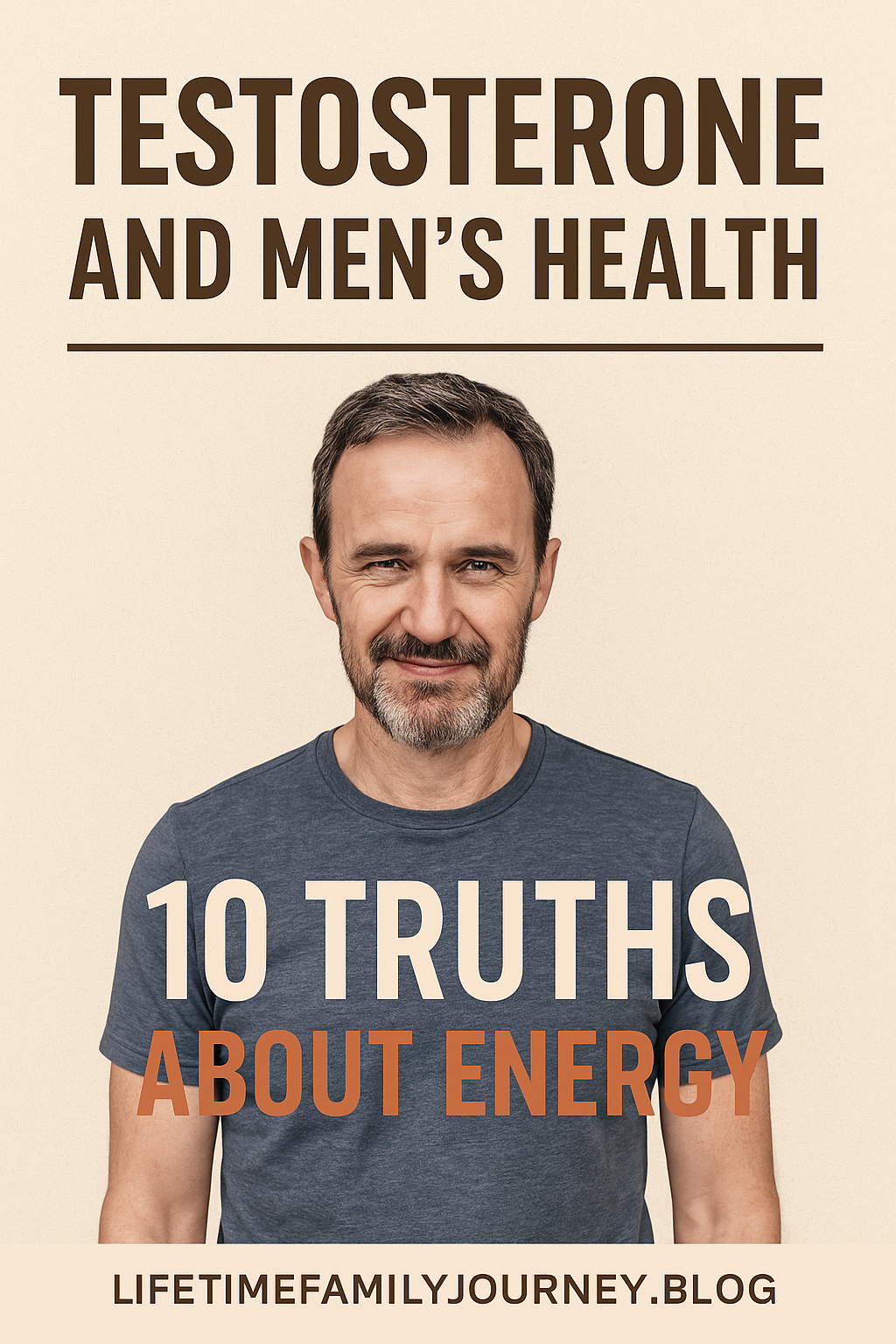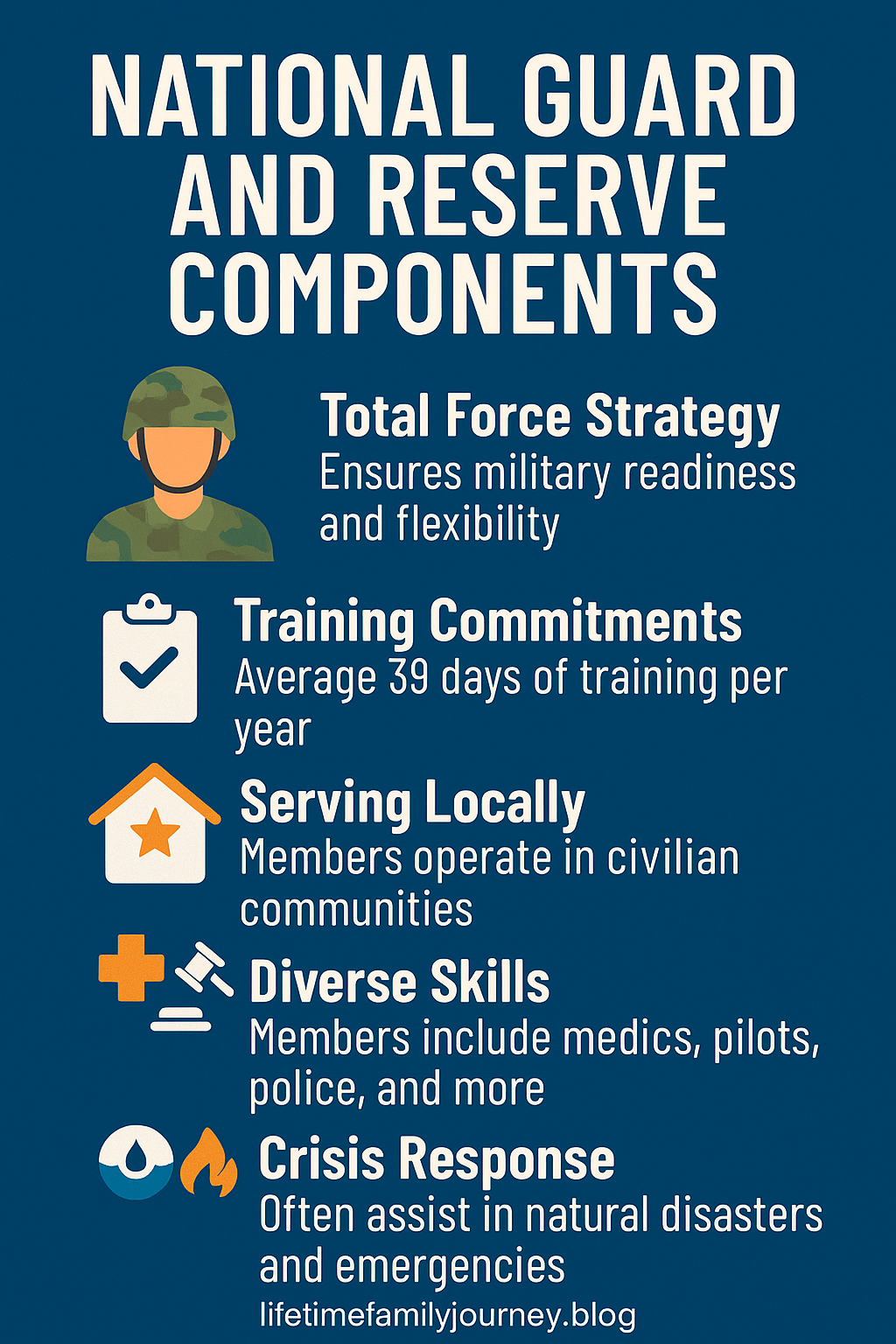Testosterone and Men’s Health: 10 Truths About Energy
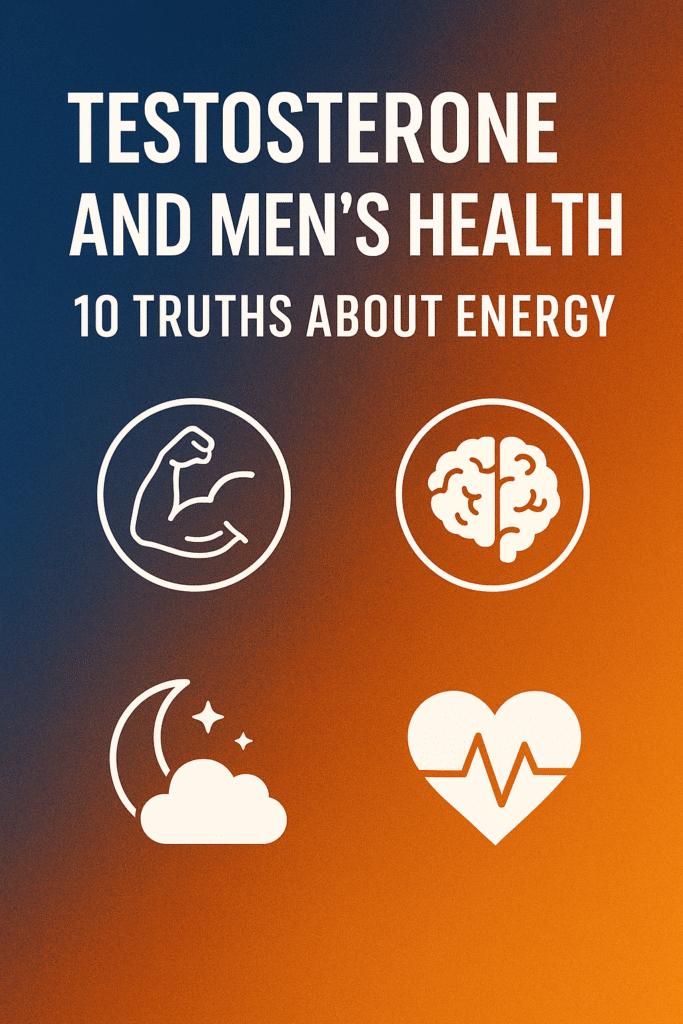
Ever wondered why you went from tossing kids in the pool like a superhero to grunting just getting off the couch? 💪 Blame the tiny hormone running the show—testosterone. One day you’re conquering the world (or at least the backyard), and the next you’re wondering if that afternoon nap is really necessary or just inevitable.
Have you noticed how some dads seem to have endless energy while others look like they’re running on empty by noon? 🔋 The difference often comes down to understanding hormones and how they impact our daily lives.
This isn’t a lecture about getting old gracefully or accepting defeat. This is the guide your body (and spouse) wishes you had—a no-nonsense look at testosterone and men’s health that cuts through the noise and gives you actionable insights. Because let’s face it, understanding your hormones shouldn’t require a medical degree or a midlife crisis.
The Unsung Hero Hormone
When we talk about hormone health, most guys think it’s just about muscle-bound gym bros or weekend warrior fantasies. 🏋️♂️ But this hormone is like the backstage manager of your entire body—quietly orchestrating everything from your energy levels to your ability to think clearly during those important work meetings.
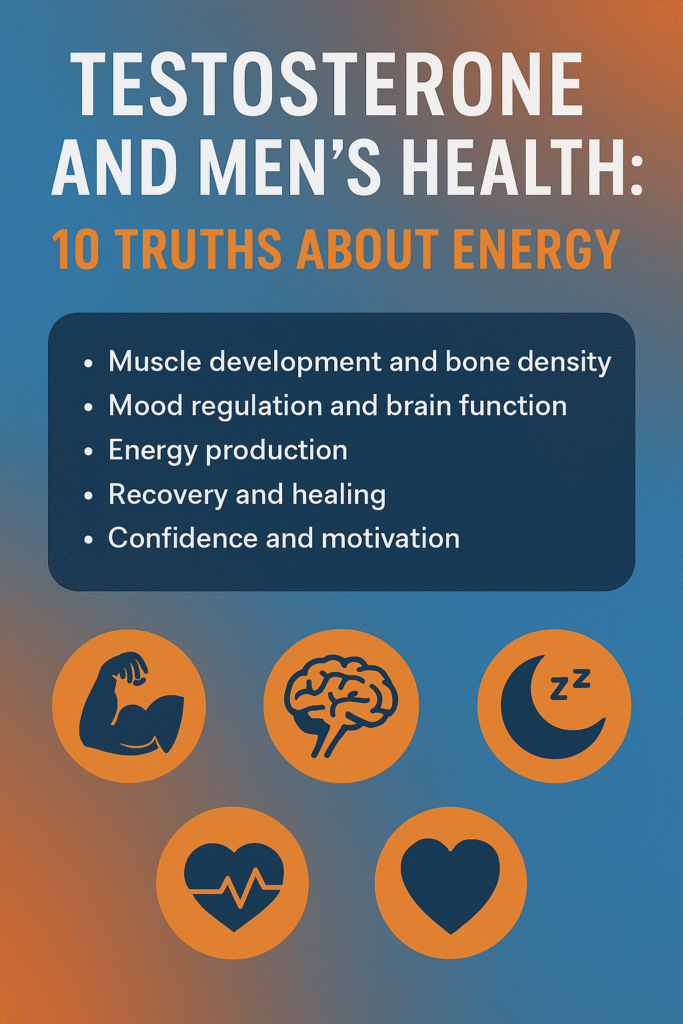
Think of testosterone as your body’s Swiss Army knife. Here’s what it actually does:
• Muscle development and bone density – keeps your frame strong enough to chase kids around
• Mood regulation and brain function – supports mental clarity and decision-making
• Energy production – like having coffee, protein powder, and a pep talk in one ☕
• Recovery and healing – helps you bounce back from workouts and daily stress
• Confidence and motivation – that “I’ve got this” feeling that makes challenges manageable
The influence extends beyond the physical realm into your mental game. When hormone levels are properly optimized, you wake up with energy, maintain focus throughout the day, and have the drive to pursue goals both big and small.
Have you ever noticed how your mood shifts when you’re feeling physically strong versus when you’re dragging? That’s your hormones working together (or against each other). 🧠
The Bottom Line: Men with healthy testosterone levels often report:
→ Better sleep quality
→ Improved recovery from workouts
→ More positive outlook on life
→ Enhanced cognitive function
→ Sharper memory and decision-making
Much like developing positive mindset habits, understanding testosterone and men’s health requires consistent attention to multiple factors that work together to create lasting change.
Low T: More Than Just Feeling Tired
Here’s where testosterone and men’s health gets tricky. Testosterone naturally declines as men age—typically about 1% per year after age 30. But there’s a significant difference between normal aging and clinically low testosterone, and understanding this distinction can be life-changing. 📉

Common Low Testosterone Symptoms Include:
1. Physical Signs
• Persistent fatigue that doesn’t improve with rest
• Unexplained weight gain (especially around the midsection)
• Decreased muscle mass despite maintaining activity
• Reduced bone density and joint issues
2. Mental & Emotional Changes
• Brain fog that makes simple tasks feel difficult
• Mood changes affecting relationships
• Feelings similar to depression or anxiety
• Loss of motivation for once-enjoyed activities
3. Sleep & Recovery Issues
• Disrupted sleep patterns
• Longer recovery times from exercise
• General sense that your body isn’t responding normally
• Decreased sexual function and libido
Do you remember when you could bounce back from a late night without feeling like you got hit by a truck? 🚛 That recovery ability is closely tied to hormone optimization.
Many men experience what feels like depression, anxiety, or irritability without realizing these symptoms might be connected to hormone imbalances. Understanding this connection helps explain why some guys struggle with these issues while others sail through middle age with energy to spare. 🔋
The Reality Check: If you’re experiencing 3+ of these symptoms consistently, it might be time to get comprehensive hormone evaluation done professionally.

The Myth of the ‘Dad Bod’
Let’s address the elephant in the room—the so-called “dad bod.” 🐘 While society has embraced this concept as an inevitable part of fatherhood, the reality is more complex. Yes, lifestyle changes that come with parenting contribute to physical changes. Late nights, stress, less time for exercise, and grabbing whatever food is convenient all play a role.
But here’s what most guys don’t realize: it’s not just burgers and Netflix causing that expanding waistline and declining energy. Hormones might be a significant factor that gets overlooked. Low testosterone can make it harder to build and maintain muscle mass, easier to accumulate fat (particularly visceral fat around the organs), and more difficult to lose weight even with proper diet and exercise.
Have you ever wondered why some dads maintain their physique while others seem to expand overnight? 🤔 The answer often lies in understanding hormone optimization.
This isn’t about body shaming or suggesting every dad needs to look like a fitness model. It’s about recognizing that some physical changes attributed to “normal aging” or “dad life” might actually indicate underlying health issues that are treatable. Understanding this distinction empowers men to make informed decisions about their health rather than simply accepting decline as inevitable. 💡
Getting Checked Without the Awkwardness
Testing hormone levels isn’t as complicated or embarrassing as many men imagine. 🩺 A simple blood test, typically done in the morning when testosterone levels are naturally highest, can provide valuable insights into your hormonal health.
What Gets Tested:
→ Total testosterone (bound and unbound combined)
→ Free testosterone (available for your body to use)
→ Sex hormone-binding globulin (SHBG)
→ Luteinizing hormone (LH)
→ Complete blood count and metabolic panel
Most tests measure total testosterone, but free testosterone—the portion available for your body to actually use—often provides a more accurate picture of your functional hormone status. Some men have normal total testosterone but low free testosterone, which can still cause symptoms.
Ever felt like your doctor rushed through your concerns about energy and mood? 😤 Finding a provider who understands hormone complexities makes all the difference.
According to the Mayo Clinic, testosterone therapy carries various benefits and risks that should be carefully considered with a healthcare provider.
Numbers vs. Symptoms
Here’s a crucial point that gets lost in discussions about testosterone and men’s health: you’re not just a lab result. 📊 Two men with identical testosterone levels might have completely different experiences. One might feel energetic and healthy while the other struggles with fatigue and mood issues.
This is why symptom evaluation is just as important as blood work. A good healthcare provider will consider both your lab results and how you actually feel. Some men function well with testosterone levels at the lower end of the “normal” range, while others need levels in the upper portion of the range to feel their best.
Have you ever left a doctor’s office feeling dismissed because your numbers looked “fine” on paper? 🙄 That’s exactly why looking beyond just lab values matters.
Factors Affecting Testing:
→ Time of day (morning levels highest)
→ Sleep quality the night before
→ Stress levels and recent exercise
→ What you ate for breakfast
→ Medications and supplements
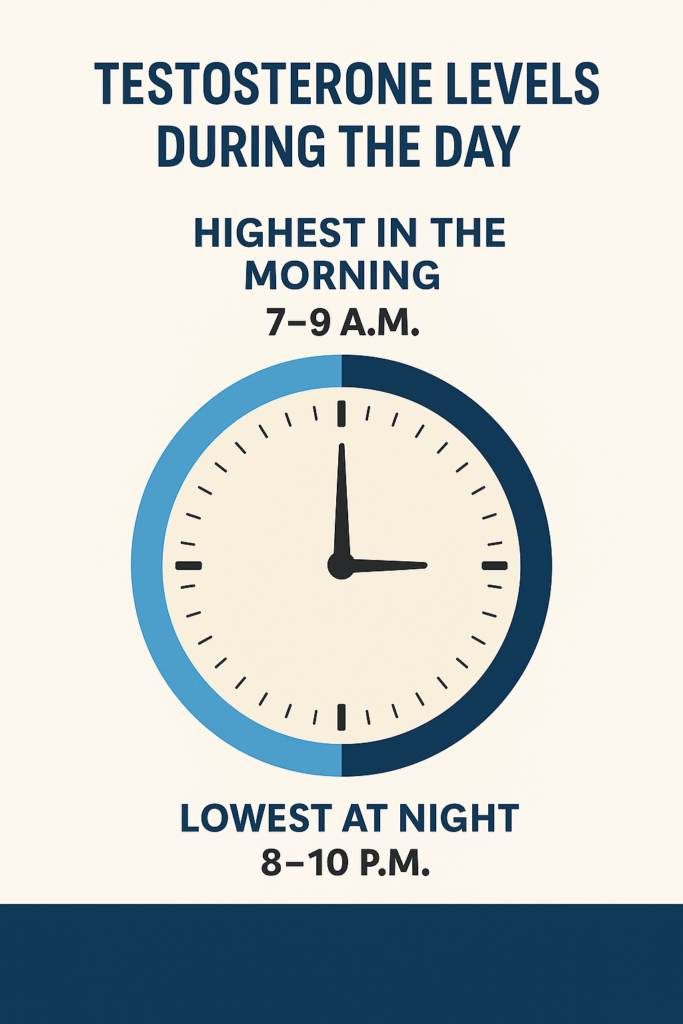
The timing of testing matters too for accurate hormone assessment. Testosterone levels fluctuate throughout the day and can be influenced by sleep, stress, recent exercise, and even what you ate for breakfast. Sometimes multiple tests over time give a clearer picture of your hormonal patterns. ✅
Treatment Options: From Broccoli to Injections
When it comes to addressing low testosterone, the approach isn’t one-size-fits-all. 🎯 Treatment options range from lifestyle modifications that anyone can implement to medical interventions that require careful monitoring. The key is finding the right approach for your specific situation.
Lifestyle Tweaks (First Line Defense)
Before jumping into medical treatments, many healthcare providers recommend optimizing lifestyle factors that naturally support testosterone production. These changes often provide benefits beyond just hormone levels and carry virtually no risks when implemented sensibly.
Do you remember feeling stronger and more energetic when you were more active? 🏃♂️ That’s not just nostalgia—exercise is one of the most powerful natural hormone boosters available.
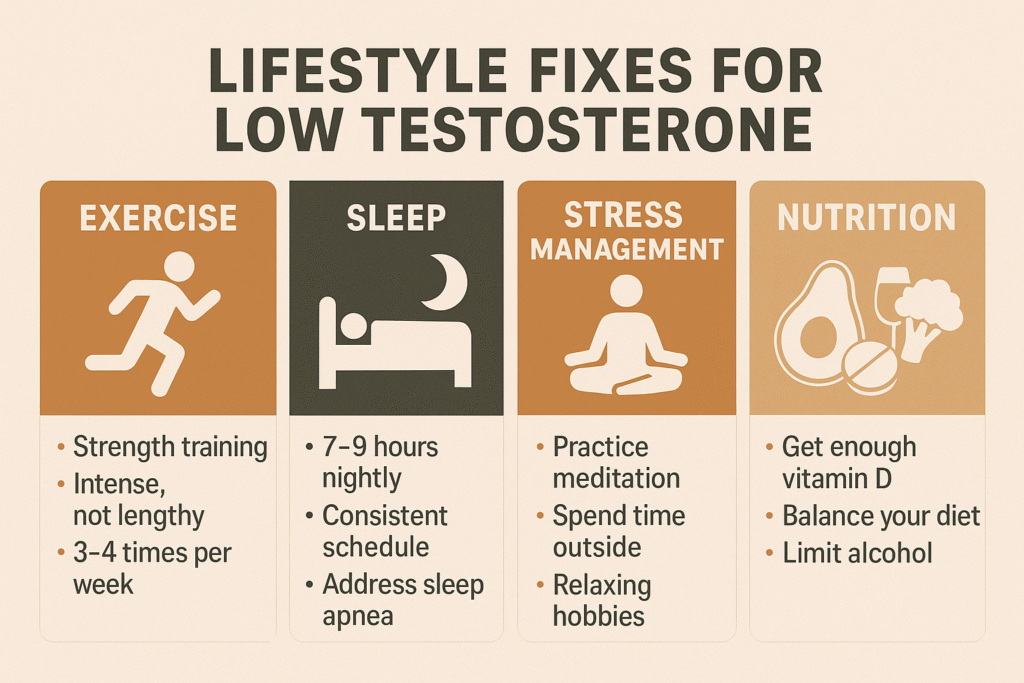
Top Natural Approaches:
1. Strength Training (The #1 Game-Changer)
→ Compound movements: squats, deadlifts, bench presses
→ Focus on intensity over duration
→ 3-4 challenging workouts per week
→ Shorter, intense sessions beat lengthy gym marathons
2. Quality Sleep (Your Hormone Factory)
→ 7-9 hours consistently each night
→ Dark, cool sleeping environment
→ Same bedtime/wake time (even weekends)
→ Address sleep apnea if you snore loudly
3. Stress Management (Cortisol is Testosterone’s Enemy)
→ Meditation or mindfulness practices 🧘♂️
→ Regular time in nature
→ Hobbies that genuinely relax you
→ Deep breathing exercises
4. Nutrition That Supports Hormones
| Nutrient | Why It Matters | Best Sources |
|---|---|---|
| Vitamin D | Directly correlates with T levels | Sunlight, supplements |
| Magnesium | Involved in T synthesis | Dark leafy greens, nuts |
| Zinc | Essential for hormone production | Oysters, beef, pumpkin seeds |
| Healthy Fats | T is made from cholesterol | Avocados, olive oil, fish |
For dads looking to get started with fitness, trail running for beginners offers an excellent entry point that combines cardiovascular benefits with hormone-supporting outdoor exercise.
Have you noticed how everything feels harder when you’re running on poor sleep? 😴 That’s your hormones crying for help.
Weight Management Reality: Excess body fat (especially belly fat) converts testosterone to estrogen. Maintaining a healthy weight helps preserve the testosterone your body produces—a crucial aspect of hormone maintenance.

Medical Options
When lifestyle modifications aren’t sufficient, several medical treatments can effectively address low testosterone. Each has distinct advantages and considerations that should be discussed thoroughly with a qualified healthcare provider. 💊

Available Treatment Options:
1. Clomiphene Citrate (Clomid) ✅ Pros:
• Stimulates natural testosterone production
• Maintains fertility/sperm production
• Oral medication (convenient)
• Reversible effects
❌ Cons:
• May not work for everyone
• Requires regular monitoring
• Can cause mood swings in some men
2. Injectable Testosterone (Most Popular)
✅ Pros:
• Consistent, reliable levels
• Most cost-effective option
• Complete control over dosing
• Weekly or bi-weekly administration
❌ Cons:
• Requires injection comfort
• Suppresses natural production
• May affect fertility
3. Topical Gels & Creams
✅ Pros:
• Daily application convenience
• Steady hormone levels throughout day
• No injections needed
❌ Cons:
• Transfer risk to family members 👶
• Skin irritation possible
• More expensive long-term
4. Testosterone Pellets
✅ Pros:
• “Set it and forget it” convenience
• 3-6 month duration
• Steady release pattern
❌ Cons:
• Can’t easily adjust dose
• Minor surgical procedure required
• Difficult to reverse if problems occur
Have you ever worried about how treatment might affect your ability to have more children? 👶 This is where understanding different treatment approaches becomes crucial for making informed decisions.
Required Monitoring for All Options:
→ Quarterly blood work (minimum first year)
→ Testosterone levels tracking (total and free)
→ Complete blood count monitoring
→ Liver function assessment
→ Prostate health screening (men 50+)
Remember: This isn’t a “start and forget” treatment—ongoing medical supervision is essential for safe, effective therapy. 📋
Supplements & Alternative Approaches
The supplement industry offers numerous products claiming to boost testosterone naturally. 💊 While some show promise in research studies, it’s important to approach these options with realistic expectations.
Natural Boosters: What Actually Works?
| Supplement | Evidence Level | Expected Effect | Worth It? |
|---|---|---|---|
| Ashwagandha | Strong | Modest T increase, stress reduction | ✅ Yes |
| Fenugreek | Moderate | Small T boost, libido support | ✅ Maybe |
| Creatine | Indirect | Muscle support, workout enhancement | ✅ Yes |
| Vitamin D | Strong | Significant if deficient | ✅ Absolutely |
| D-Aspartic Acid | Weak/Mixed | Inconsistent results | ❌ Skip it |
What Natural Boosters CAN Do:
→ Provide modest support (5-15% improvement)
→ Help with stress-related hormone issues
→ Support overall health and energy
→ Work well alongside lifestyle changes
What Natural Boosters CANNOT Do:
→ Transform severely low T into optimal levels
→ Replace proper medical treatment
→ Work overnight or provide dramatic changes
→ Fix poor sleep, diet, or exercise habits
Do you find yourself overwhelmed by all the supplement claims out there? 🤔 Understanding which options actually have research backing helps cut through the marketing noise.
The Bottom Line: Most natural testosterone boosters provide modest effects at best. They’re not going to transform someone with clinically low testosterone into someone with optimal levels. However, as part of a comprehensive approach that includes lifestyle optimization, some men may find them helpful. The key is maintaining realistic expectations and not delaying appropriate medical treatment if needed. ⚖️
Because You’re Not Just a Hormone Factory
Hormone optimization isn’t just about getting one number in the right range—it’s about supporting your entire health picture. 💪 A comprehensive approach addresses multiple factors that influence how you feel and function daily.
Nutrition & Weight Management
Nutrition for hormone support doesn’t require exotic supplements or restrictive diets. Focus on whole foods that provide the nutrients your body needs for hormone production while maintaining a healthy weight and energy levels.
Protein Requirements:
→ Adequate protein supports muscle mass maintenance
→ Correlates directly with healthy hormone levels
→ Aim for protein at each meal from quality sources
→ Most active men need 0.8-1.2 grams per pound of body weight
Essential Healthy Fats: Since testosterone is made from cholesterol, healthy fats provide the building blocks your body needs:
→ Avocados and olive oil
→ Nuts and seeds (especially walnuts, almonds)
→ Fatty fish (salmon, mackerel, sardines)
→ Coconut oil and grass-fed butter
Don’t fall for the low-fat diet trap—your hormones need adequate dietary fat to function properly.
Smart Carbohydrate Choices:
→ Complex carbs from vegetables and fruits
→ Whole grains for steady energy
→ Timing matters: post-workout carbs support recovery
→ Limit processed foods and excessive sugar
Just as building healthy family routines requires consistency and planning, optimizing nutrition for hormone health benefits from sustainable, long-term approaches rather than extreme short-term changes.
Alcohol’s Impact: Alcohol directly suppresses testosterone production and interferes with sleep quality. Moderate consumption (occasional glass of wine) likely won’t cause problems, but regular heavy drinking can significantly impact hormone levels and overall well-being.
Fitness & Strength
Exercise is one of the most powerful natural hormone boosters available, but not all exercise is created equal. 🏋️♂️ The type, intensity, and duration of your workouts can significantly influence their hormonal benefits.
Resistance Training Benefits:
→ Compound movements work multiple muscle groups
→ Create the greatest hormonal response
→ Focus on squats, deadlifts, pull-ups, overhead presses
→ Intensity matters more than duration
High-Intensity Interval Training (HIIT):
→ Boosts testosterone levels effectively
→ Provides cardiovascular benefits
→ Short bursts of intense activity
→ More effective than steady-state cardio for hormones
Recovery Requirements:
→ 3-4 challenging workouts per week maximum
→ Adequate rest between sessions prevents overtraining
→ Overtraining actually suppresses testosterone production
→ Your body needs time to adapt and grow stronger
Don’t neglect cardiovascular health in pursuit of hormone optimization. Heart health supports circulation, which is essential for hormone delivery throughout your body. A combination of resistance training and cardio provides the best overall health benefits.
The Harvard Health Publishing provides comprehensive information about testosterone’s role in men’s health and the importance of lifestyle factors in testosterone and men’s health optimization.
Sleep & Recovery
Sleep might be the most underappreciated factor in hormone production. 😴 During deep sleep phases, your body produces the majority of its daily testosterone. Chronic sleep deprivation can reduce testosterone levels by 10-15% in just one week.
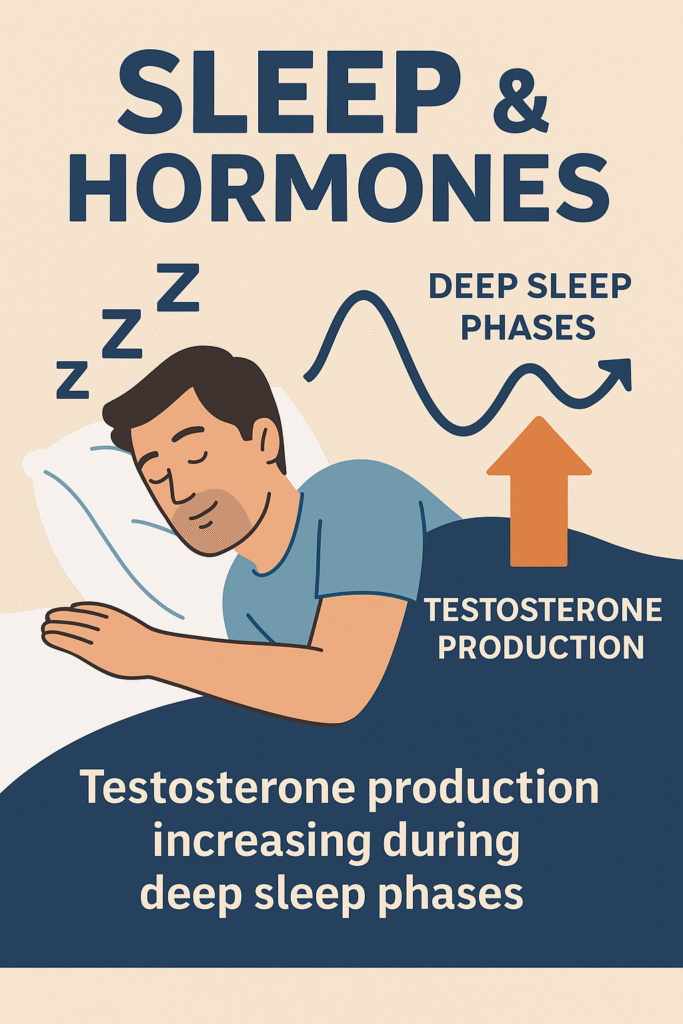
Quality Sleep Requirements:
→ 7-9 hours consistently each night
→ Quality matters as much as quantity
→ Wake up feeling refreshed and energized
→ Maintain energy throughout day without excessive caffeine
Sleep Apnea Warning Signs:
→ Loud snoring (ask your partner!)
→ Feeling tired despite adequate sleep time
→ Partner notices interrupted breathing during sleep
→ Morning headaches or dry mouth
Sleep apnea affects millions of men and can severely suppress testosterone production. If you’re experiencing symptoms, evaluation is crucial. Treating sleep apnea often leads to significant improvements in hormone levels and energy.
Creating a Sleep-Friendly Environment:
→ Cool, dark rooms promote deeper sleep phases
→ Limit screen time 1-2 hours before bed
→ Consistent sleep and wake times (even weekends!)
→ Remove electronic devices from bedroom
Implementing daily health and well-being strategies can create a foundation that supports both better sleep and optimal hormone production.

Mental Health & Relationships
Hormone health involves a bidirectional relationship between hormones and mental well-being. 🧠 Testosterone influences mood, confidence, and motivation, but mental health also affects hormone production.
Depression and anxiety can suppress testosterone levels, while low testosterone can contribute to mood disorders. This bidirectional relationship means addressing both psychological and physical health often provides better outcomes than focusing on either aspect alone.
Relationship Quality Impact:
→ Strong social connections support mental health
→ Family and close friendships positively influence hormone levels
→ Isolation and chronic relationship stress have opposite effect
→ Quality relationships are medicine for overall health
Sexual health is obviously connected to testosterone levels, but the relationship is complex. While adequate testosterone supports sexual function, factors like stress, relationship quality, physical health, and psychological well-being all play important roles. Remember: Testosterone might fuel attraction, but kindness keeps you married.
Confidence and motivation often improve with hormone optimization, but they’re also influenced by achieving goals, maintaining purpose, and contributing meaningfully to your family and community. Hormone optimization works best when it’s part of a broader approach to health and wellness.
For families dealing with challenges, understanding what you can live without can help prioritize what truly matters for long-term health and happiness.
TRT Isn’t a Free Ticket to Hulk Mode
Testosterone replacement therapy can be life-changing for men with genuine deficiency, but it’s not a magic solution without considerations and potential risks. Understanding both the benefits and limitations helps ensure realistic expectations and safe treatment.
Important Considerations:
🚨 Fertility Impact
• External testosterone suppresses natural production
• Can significantly reduce sperm count
• Effects usually reversible but may take 6-18 months
• Critical consideration for men planning children
❤️ Cardiovascular Considerations
• Mixed research on heart health effects
• May increase red blood cell count
• Regular monitoring essential for safety
• Individual risk assessment needed
🩺 Prostate Health Monitoring
• Doesn’t cause prostate cancer
• Can potentially accelerate existing issues
• Regular PSA screening becomes more important
• Especially crucial for men over 50
🩸 Blood Clot Risks
• Increased risk in some men
• Higher hematocrit (blood thickness) possible
• Deep vein thrombosis concern
• Regular blood work monitors this
😴 Sleep Apnea Warning
• TRT can worsen existing sleep apnea
• May increase upper airway resistance
• Address sleep issues before starting TRT
• Monitor breathing during treatment
Have you been sold on TRT as a miracle cure? 🤔 The reality is more nuanced—it’s powerful medicine that requires respect and proper medical oversight.
Required Monitoring Schedule:
→ Month 1-3: Monthly blood work
→ Month 4-12: Quarterly monitoring
→ Year 2+: Every 6 months (minimum)
What Gets Tested:
• Total and free testosterone levels
• Complete blood count (CBC)
• Comprehensive metabolic panel
• Lipid profile
• PSA (prostate-specific antigen)
• Liver function tests
The Bottom Line: TRT can dramatically improve quality of life for men with genuine testosterone deficiency, but it’s not a shortcut to superhuman performance. Work with qualified providers who prioritize safety alongside effectiveness.
What I’ve Learned Along the Way
Personal experience with fatigue and energy decline taught me that symptoms we often attribute to “normal aging” or busy lifestyles might deserve closer examination. 🎯 The gradual nature of hormonal changes makes them easy to dismiss until they significantly impact quality of life.
Working with healthcare providers has shown me the importance of finding someone who listens to symptoms rather than just reviewing lab results. The best medical care considers both objective data and subjective experience. If your doctor dismisses legitimate concerns because your numbers fall within a broad statistical range, it might be worth seeking a second opinion.
Have you ever felt like you were complaining about nothing, only to discover there was actually something wrong? 🤷♂️ That’s exactly what happened to me.
Recovery from workouts became noticeably slower in my late thirties and early forties. What once took a day or two to recover from began taking a week or more. While some of this reflects natural aging, optimizing hormone levels can significantly improve recovery and maintain the ability to stay active.
My kids think I drink protein shakes to keep up with them. They’re not wrong. 😅 Maintaining energy levels to fully engage with family life motivates many men to take their health more seriously. It’s not about ego or vanity—it’s about being present and capable for the people who matter most.
Much like being back to school ready requires preparation and energy, maintaining optimal health allows dads to show up fully for all the demands of family life.
The journey taught me that hormone optimization is rarely about one single factor. Testosterone levels matter, but so do sleep, stress management, nutrition, exercise, and overall lifestyle patterns. The men who feel their best typically address multiple aspects of health rather than focusing solely on hormone levels.
Patience is essential because meaningful changes take time. Whether through lifestyle modifications or medical treatment, improvements in energy, mood, and physical capacity often develop gradually over months rather than weeks. Setting realistic expectations prevents discouragement during the process.
For veterans like myself, accessing VA disability process guidance can be crucial for getting the healthcare support needed to address hormone-related health issues. 🎖️
More Than Numbers, It’s About Living Fully
Testosterone and men’s health matters—there’s no question about that. 💪 When levels are optimal, most men feel more energetic, confident, and capable. Physical performance improves, mood stabilizes, and that general sense of well-being that makes life enjoyable returns. But hormone health is only one piece of a much larger health puzzle. The key is taking a comprehensive approach to health that addresses all aspects of well-being.

The most important lesson is that you don’t have to accept decline as inevitable. Many symptoms men attribute to “getting older” are actually treatable conditions that can significantly improve with appropriate intervention. Fatigue, weight gain, mood changes, and decreased motivation aren’t badges of aging—they’re signals that something might need attention.
Don’t ignore symptoms that affect your quality of life. If you’re consistently tired despite adequate sleep, struggling with motivation that was never a problem before, or finding that your body isn’t responding to diet and exercise the way it used to, these deserve evaluation. Many men suffer unnecessarily because they don’t realize help is available.
Have you been telling yourself “this is just what happens as you get older” when deep down you know something’s off? 🤔 Trust that instinct—hormone problems are more common than you think.
Working with qualified healthcare providers makes the difference between guessing and getting results. Look for providers who understand both the science of hormone optimization and the importance of individualized care. The best approach considers your symptoms, goals, lifestyle, and personal circumstances rather than applying a one-size-fits-all protocol.
Remember that optimization isn’t about returning to your twenties or achieving some idealized version of masculinity. It’s about feeling like yourself at your best—having the energy to engage fully with work, family, and personal interests. It’s about waking up ready to tackle the day and going to bed satisfied with what you accomplished. 🎯
The goal isn’t perfection; it’s about maximizing your potential within realistic parameters. Some decline is natural and expected as we age, but dramatic changes in energy, mood, and physical capability often indicate addressable issues rather than inevitable decline.
Take action sooner rather than later. Many men wait years before addressing symptoms, assuming they’ll eventually adapt or that the problems will resolve themselves. Meanwhile, they miss opportunities for career advancement, family activities, and personal fulfillment that could be enhanced with better health.
Understanding home safety tips and other aspects of family preparedness becomes easier when you have the energy and mental clarity that come with optimized health.
Because life’s too short to be too tired to live it. 😴 Your family, career, and personal goals deserve your best effort, and you deserve to feel capable of giving it. Hormone optimization, whether through lifestyle changes or medical treatment, is an investment in your ability to fully engage with everything that matters to you.
The path forward starts with honest self-assessment and appropriate professional guidance. Your health is worth the investment of time and attention required to optimize it. Take the first step, stay consistent with whatever approach you choose, and remember that feeling your best isn’t selfish—it’s essential for being the man your family and community need you to be.
Just as letting go of things beyond our control can bring peace, accepting that hormone optimization is a journey rather than a destination helps maintain realistic expectations while pursuing meaningful improvements in health and vitality. ✨

More from Our Family of Blogs:
Lifetime Family Journey – Stories, guides, and lessons from life in a big family.
Mountains Will Move – Faith, resilience, and encouragement for life’s hardest battles.
Everyday Exposed – Real talk on culture, media, and the world we’re raising our kids in.
